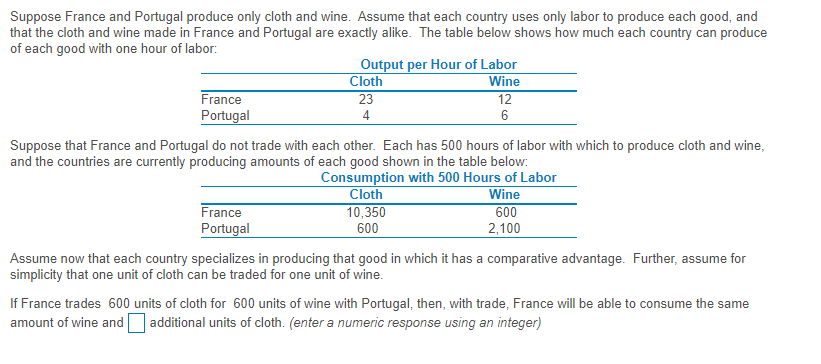Suppose France and Portugal produce only cloth and wine. Assume that each country uses only labor to produce each good, and that the cloth and wine made in France and Portugal are exactly alike. The table below shows how much each country can produce of each good with one hour of labor: Output per Hour of Labor Cloth 23 Wine 12 France Portugal 4 6 Suppose that France and Portugal do not trade with each other. Each has 500 hours of labor with which to produce cloth and wine, and the countries are currently producing amounts of each good shown in the table below: Consumption with 500 Hours of Labor Wine 600 2,100 Cloth 10,350 France Portugal 600 Assume now that each country specializes in producing that good in which it has a comparative advantage. Further, assume for simplicity that one unit of cloth can be traded for one unit of wine. If France trades 600 units of cloth for 600 units of wine with Portugal, then, with trade, France will be able to consume the same amount of wine andO additional units of cloth. (enter a numeric response using an integer)
Suppose France and Portugal produce only cloth and wine. Assume that each country uses only labor to produce each good, and that the cloth and wine made in France and Portugal are exactly alike. The table below shows how much each country can produce of each good with one hour of labor: Output per Hour of Labor Cloth 23 Wine 12 France Portugal 4 6 Suppose that France and Portugal do not trade with each other. Each has 500 hours of labor with which to produce cloth and wine, and the countries are currently producing amounts of each good shown in the table below: Consumption with 500 Hours of Labor Wine 600 2,100 Cloth 10,350 France Portugal 600 Assume now that each country specializes in producing that good in which it has a comparative advantage. Further, assume for simplicity that one unit of cloth can be traded for one unit of wine. If France trades 600 units of cloth for 600 units of wine with Portugal, then, with trade, France will be able to consume the same amount of wine andO additional units of cloth. (enter a numeric response using an integer)
Principles of Microeconomics
7th Edition
ISBN:9781305156050
Author:N. Gregory Mankiw
Publisher:N. Gregory Mankiw
Chapter3: Interdependence And The Gains From Trade
Section: Chapter Questions
Problem 5PA
Related questions
Question
I recently sent in a similiar question and was rejected for a reason that didn't make sense to me. This is a homework problem that I am unable to solve and there are several like them, I really need assistance because I am unable to understand how to even get the answer.

Transcribed Image Text:Suppose France and Portugal produce only cloth and wine. Assume that each country uses only labor to produce each good, and
that the cloth and wine made in France and Portugal are exactly alike. The table below shows how much each country can produce
of each good with one hour of labor:
Output per Hour of Labor
Cloth
23
Wine
12
France
Portugal
4
6
Suppose that France and Portugal do not trade with each other. Each has 500 hours of labor with which to produce cloth and wine,
and the countries are currently producing amounts of each good shown in the table below:
Consumption with 500 Hours of Labor
Wine
600
Cloth
France
10,350
Portugal
600
2,100
Assume now that each country specializes in producing that good in which it has a comparative advantage. Further, assume for
simplicity that one unit of cloth can be traded for one unit of wine.
If France trades 600 units of cloth for 600 units of wine with Portugal, then, with trade, France will be able to consume the same
amount of wine and additional units of cloth. (enter a numeric response using an integer)
Expert Solution
This question has been solved!
Explore an expertly crafted, step-by-step solution for a thorough understanding of key concepts.
This is a popular solution!
Trending now
This is a popular solution!
Step by step
Solved in 2 steps with 2 images

Knowledge Booster
Learn more about
Need a deep-dive on the concept behind this application? Look no further. Learn more about this topic, economics and related others by exploring similar questions and additional content below.Recommended textbooks for you

Principles of Microeconomics
Economics
ISBN:
9781305156050
Author:
N. Gregory Mankiw
Publisher:
Cengage Learning

Brief Principles of Macroeconomics (MindTap Cours…
Economics
ISBN:
9781337091985
Author:
N. Gregory Mankiw
Publisher:
Cengage Learning

Principles of Macroeconomics (MindTap Course List)
Economics
ISBN:
9781305971509
Author:
N. Gregory Mankiw
Publisher:
Cengage Learning

Principles of Microeconomics
Economics
ISBN:
9781305156050
Author:
N. Gregory Mankiw
Publisher:
Cengage Learning

Brief Principles of Macroeconomics (MindTap Cours…
Economics
ISBN:
9781337091985
Author:
N. Gregory Mankiw
Publisher:
Cengage Learning

Principles of Macroeconomics (MindTap Course List)
Economics
ISBN:
9781305971509
Author:
N. Gregory Mankiw
Publisher:
Cengage Learning

Essentials of Economics (MindTap Course List)
Economics
ISBN:
9781337091992
Author:
N. Gregory Mankiw
Publisher:
Cengage Learning

Principles of Microeconomics (MindTap Course List)
Economics
ISBN:
9781305971493
Author:
N. Gregory Mankiw
Publisher:
Cengage Learning

Principles of Economics (MindTap Course List)
Economics
ISBN:
9781305585126
Author:
N. Gregory Mankiw
Publisher:
Cengage Learning